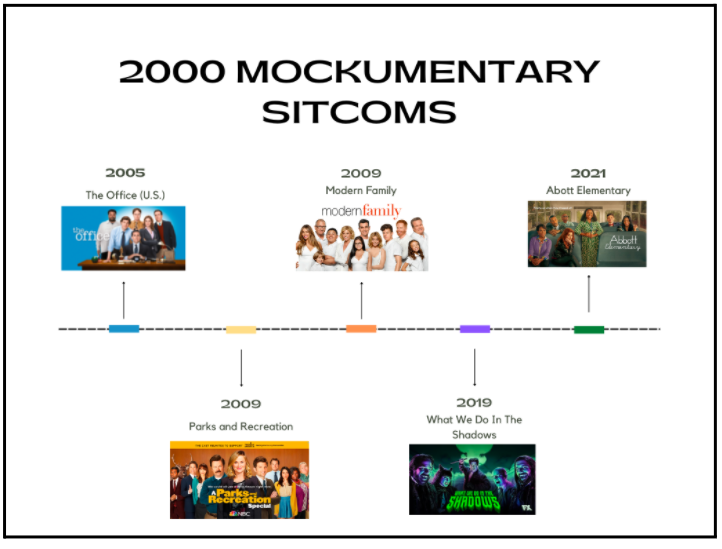At the turn of the century, there was a major shift in the formula of American sitcoms with the introduction of the mockumentary, but after two decades of critical successes and inevitable cancellations, they’ve become increasingly few and far between, so what can audiences expect to see next on the small screen? -- Ava Rukavina, 10th Grade
A mockumentary is a film or series that imitates the style of a documentary. One of the first to utilize this style was 2001 Canadian series “Trailer Park Boys,” they created this feel by incorporating intentionally poor camera work, and having characters break the fourth wall. Just a few months after “Trailer Park Boys” debuted, “The Office (UK)” would go on air, presenting audiences with a similar style of filming; it went on to receive a second season but was canceled shortly thereafter. A few years later, in 2005, the American broadcasting network, NBC would release a new adaptation of “The Office,” which skyrocketed in popularity, it would go on to receive nine seasons, and inspired many other shows, cementing the mockumentary as a staple of 2000s sitcoms.
The success of “The Office (U.S.)” was due, largely because it was so relatable to audiences. Viewers were used to the canned laughter, one-dimensional characters, and 3-wall sets of 1990’s sitcoms. The way that the characters in “The Office” addressed the audience made viewers feel more involved in the story, so narratives didn’t seem so fabricated or inaccessible. The show was also set in the workplace, which is a familiar location for most, seeing your day-to-day life reflected on screen, and finding humor in that was refreshing. This style was later adapted by some of the most critically acclaimed shows of the past few decades, “Parks and Recreation,” an upbeat & goofy workplace comedy and “Modern Family,” a domestic comedy featuring complex & relatable characters, have a total 99 Emmy wins and nominations between them.
Some sitcoms even took breaks from their usual style to explore the mockumentary format, like in the “Community” episode, “Intermediate Documentary Filmmaking,” in which one of the main characters says, “I’m excited by the narrative facility of the documentary format. It’s easier to tell a complex story when you can just cut to people explaining things to the camera,” which may be, yet another reason, that the mockumentary is so popular among studios and audiences.
There are still a few mockumentaries on today – “What We Do In The Shadows,” based on the 2014 film by the same name, follows the hilariously absurd lives of four vampires who’ve been living together for the past century; it's been renewed for a fifth and sixth season. The popular “Abbott Elementary” which follows the chaotic lives of teachers at an underfunded public school in Philadelphia, is currently wrapping up its second season. But with the overly abundant selection of content available on streaming services nowadays, these shows have developed niche fanbases, rather than universal followings held by early 2000s mockumentaries. Nothing lasts forever; the mockumentary has been taking over television for over two decades now, and we’re entering a new era of television.
As we step back and take a look at trends exhibited by American sitcoms since the dawn of TV, there are a few things we start to notice. Series are becoming less episodic, and more serialized; episodes of sitcoms in the 20th century were almost entirely self contained, so that audiences tuning in mid-season weren’t confused, whereas nowadays, it seems that every episode is a continuation of the last as streaming services battle for their audience’s shortened attention spans.
There is another characteristic of these sitcoms that is employed less and less as time goes on: privilege. Shows nowadays aim to put more of an emphasis on the experiences of people who have had to fight for representation in American media, such as people of color, women, queer people and the lower class, and in turn, need to adapt to accurately depict their experiences and the hardships they undergo. Because of this, comedies are becoming darker. This doesn’t mean that the shows can’t be funny, in fact these dark comedies have embraced a new, cynical humor. “Reservation Dogs” a 2021 dramadey, explores all of these aspects, it follows a group of lower-class Indigenous kids, who steal in the hopes of saving up enough money to run away to California.
The darker, more serialized, and dramatized, sitcoms that have come out in recent years, don’t really feel like sitcoms at all, because television is moving away from this genre as a whole. The point of sitcoms was for people to turn their brain off and have a quick laugh, but nowadays much of that is already satisfied by scrolling on social media. If sitcoms are disappearing, we shouldn’t mourn its loss but celebrate what’s to come. Since its birth, television has been changing, but it’s not becoming increasingly out of touch, in fact it’s the opposite, television continues to adapt to our ever-evolving world.
Some sitcoms even took breaks from their usual style to explore the mockumentary format, like in the “Community” episode, “Intermediate Documentary Filmmaking,” in which one of the main characters says, “I’m excited by the narrative facility of the documentary format. It’s easier to tell a complex story when you can just cut to people explaining things to the camera,” which may be, yet another reason, that the mockumentary is so popular among studios and audiences.
There are still a few mockumentaries on today – “What We Do In The Shadows,” based on the 2014 film by the same name, follows the hilariously absurd lives of four vampires who’ve been living together for the past century; it's been renewed for a fifth and sixth season. The popular “Abbott Elementary” which follows the chaotic lives of teachers at an underfunded public school in Philadelphia, is currently wrapping up its second season. But with the overly abundant selection of content available on streaming services nowadays, these shows have developed niche fanbases, rather than universal followings held by early 2000s mockumentaries. Nothing lasts forever; the mockumentary has been taking over television for over two decades now, and we’re entering a new era of television.
As we step back and take a look at trends exhibited by American sitcoms since the dawn of TV, there are a few things we start to notice. Series are becoming less episodic, and more serialized; episodes of sitcoms in the 20th century were almost entirely self contained, so that audiences tuning in mid-season weren’t confused, whereas nowadays, it seems that every episode is a continuation of the last as streaming services battle for their audience’s shortened attention spans.
There is another characteristic of these sitcoms that is employed less and less as time goes on: privilege. Shows nowadays aim to put more of an emphasis on the experiences of people who have had to fight for representation in American media, such as people of color, women, queer people and the lower class, and in turn, need to adapt to accurately depict their experiences and the hardships they undergo. Because of this, comedies are becoming darker. This doesn’t mean that the shows can’t be funny, in fact these dark comedies have embraced a new, cynical humor. “Reservation Dogs” a 2021 dramadey, explores all of these aspects, it follows a group of lower-class Indigenous kids, who steal in the hopes of saving up enough money to run away to California.
The darker, more serialized, and dramatized, sitcoms that have come out in recent years, don’t really feel like sitcoms at all, because television is moving away from this genre as a whole. The point of sitcoms was for people to turn their brain off and have a quick laugh, but nowadays much of that is already satisfied by scrolling on social media. If sitcoms are disappearing, we shouldn’t mourn its loss but celebrate what’s to come. Since its birth, television has been changing, but it’s not becoming increasingly out of touch, in fact it’s the opposite, television continues to adapt to our ever-evolving world.



